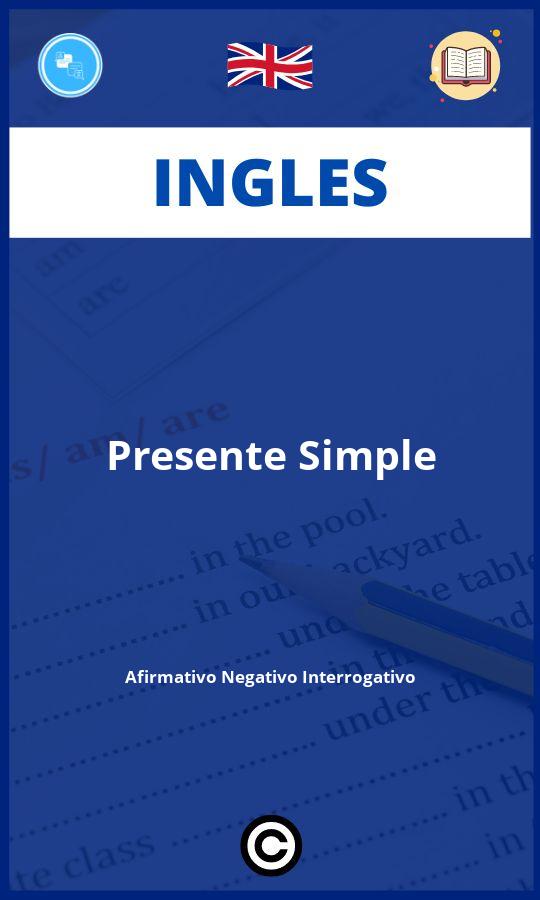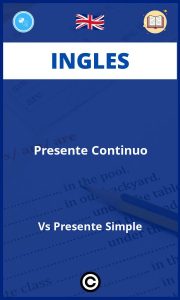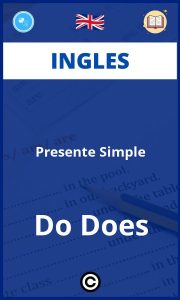
Abrir Ejercicios Ingles Presente Simple Afirmativo Negativo Interrogativo – PDF
Teoria – Explicacion y Ejemplos Ingles Presente Simple Afirmativo Negativo Interrogativo
En inglés presente simple afirmativo, el verbo se conjuga en su forma base (I work, you work, he works, she works, it works, we work, they work), mientras que en inglés presente simple negativo, se añade la partícula not después del verbo auxiliar to do (I don’t work, you don’t work, he doesn’t work, she doesn’t work, it doesn’t work, we don’t work, they don’t work).
En inglés presente simple interrogativo, el verbo auxiliar to do se coloca delante del sujeto, y el verbo se conjuga en su forma base ( Do I work?, Do you work?, Does he work?, Does she work?, Does it work?, Do we work?, Do they work?).
Veamos estos ejemplos en frases:
- I work in a bank. (Trabajo en un banco.)
- I don’t work in a bank. (No trabajo en un banco.)
- Do I work in a bank? (¿Trabajo en un banco?)
En el inglés presente simple afirmativo, el verbo to be se conjuga de la siguiente manera:
- I am a doctor. (Soy médico.)
- You are a doctor. (Eres médico.)
- He is a doctor. (Él es médico.)
- She is a doctor. (Ella es médica.)
- It is a cat. (Es un gato.)
- We are doctors. (Somos médicos.)
- They are doctors. (Ellos son médicos.)
En el inglés presente simple negativo, se añade la partícula not después del verbo auxiliar to be:
- I am not a doctor. (No soy médico.)
- You are not a doctor. (No eres médico.)
- He is not a doctor. (No es médico.)
- She is not a doctor. (No es médica.)
- It is not a cat. (No es un gato.)
- We are not doctors. (No somos médicos.)
- They are not doctors. (Ellos no son médicos.)
En el inglés presente simple interrogativo, el verbo auxiliar to be se coloca delante del sujeto, y el verbo se conjuga en su forma base:
- Am I a doctor? (¿Soy médico?)
- Are you a doctor? (¿Eres médico?)
- Is he a doctor? (¿Es médico?)
- Is she a doctor? (¿Es médica?)
- Is it a cat? (¿Es un gato?)
- Are we doctors? (¿Somos médicos?)
- Are they doctors? (¿Son médicos?)
Ejercicios con soluciones de Ingles Presente Simple Afirmativo Negativo Interrogativo
Are you looking for some Present Simple exercises with solutions? You’ve come to the right place! In this article, we’ll give you a few exercises to practice this important English tense, as well as provide the answers so you can check your work.
The Present Simple is used to describe habits, permanent situations and universal truths. It’s also used to describe scheduled future events. To form a sentence in the Present Simple, we use the base form of the verb (I work, you play, he writes, etc.), without the to. For regular verbs, we add -s in the third person singular (he works, she plays, it writes). For irregular verbs, the spelling changes in the third person singular (I have, he has, she has, etc.).
Now let’s move on to the exercises!
Exercise 1
Complete the following sentences with the correct form of the verb in Present Simple. Remember to add -s in the third person singular.
- I __________ (not drink) coffee.
- You __________ (walk) to school.
- We __________ (live) in Madrid.
- They __________ (teach) English.
- It __________ (rain) a lot in winter.
Answers: I don’t drink coffee. You walk to school. We live in Madrid. They teach English. It rains a lot in winter.
Exercise 2
Complete the following sentences with the correct form of the verb in Present Simple. Remember to use the irregular forms of the verbs in the third person singular.
- I __________ (have) a dog.
- You __________ (have) two brothers.
- He __________ (have) a lot of friends.
- She __________ (have) long hair.
- It __________ (have) four legs.
Answers: I have a dog. You have two brothers. He has a lot of friends. She has long hair. It has four legs.
Exercise 3
Complete the following sentences with the correct form of the verb in Present Simple. Remember to add -es in the third person singular.
- I __________ (watch) TV every day.
- You __________ (wash) your hands before eating.
- He __________ (catch) the bus at 7:00 a.m.
- She __________ (miss) her train.
- It __________ (hurt) when you fall.
Answers: I watch TV every day. You wash your hands before eating. He catches the bus at 7:00 a.m. She misses her train. It hurts when you fall.
Exercise 4
Complete the following sentences with the correct form of the verb in Present Simple. Remember to use the irregular forms of the verbs in the third person singular.
- I __________ (do) my homework every day.
- You __________ (do) the dishes.
- He __________ (do) his best.
- She __________ (do) a lot of sport.
- It __________ (do) well in exams.
Answers: I do my homework every day. You do the dishes. He does his best. She does a lot of sport. It does well in exams.
Exercise 5
Complete the following sentences with the correct form of the verb in Present Simple. Remember to add -es in the third person singular.
- I __________ (go) to the cinema every weekend.
- You __________ (go) to the park.
- He __________ (go) to work by car.
- She __________ (go) to bed at 10:00 p.m.
- It __________ (go) fast.
Answers: I go to the cinema every weekend. You go to the park. He goes to work by car. She goes to bed at 10:00 p.m. It goes fast.
Exercise 6
Complete the following sentences with the correct form of the verb in Present Simple. Remember to use the irregular forms of the verbs in the third person singular.
- I __________ (have) a lot of fun.
- You __________ (have) a party tonight.
- He __________ (have) two dogs.
- She __________ (have) a cold.
- It __________ (have) a lot of energy.
Answers: I have a lot of fun. You have a party tonight. He has two dogs. She has a cold. It has a lot of energy.
Exercise 7
Complete the following sentences with the correct form of the verb in Present Simple. Remember to add -es in the third person singular.
- I __________ (like) swimming.
- You __________ (like) playing the guitar.
- He __________ (like) reading.
- She __________ (like) going out at night.
- It __________ (like) being in the sun.
Answers: I like swimming. You like playing the guitar. He likes reading. She likes going out at night. It likes being in the sun.
Exercise 8
Complete the following sentences with the correct form of the verb in Present Simple. Remember to add -es in the third person singular.
- I __________ (need) to buy some milk.
- You __________ (need) to go to the doctor.
- He __________ (need) to fix his bike.
- She __________ (need) to study more.
- It __________ (need) to be watered.
Answers: I need to buy some milk. You need to go to the doctor. He needs to fix his bike. She needs to study more. It needs to be watered.
Exercise 9
Complete the following sentences with the correct form of the verb in Present Simple. Remember to add -es in the third person singular.
- I __________ (want) to go to the beach.
- You __________ (want) to be a doctor.
- He __________ (want) to travel around the world.
- She __________ (want) to be a famous singer.
- It __________ (want) to be a star.
Answers: I want to go to the beach. You want to be a doctor. He wants to travel around the world. She wants to be a famous singer. It wants to be a star.
Exercise 10
Complete the following sentences with the correct form of the verb in Present Simple. Remember to add
Abrir Ejercicios Presente Simple Afirmativo Negativo Interrogativo Ingles – PDF






